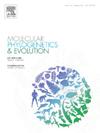系统基因组学与海鸥物种(Puffinus mauretanicus, P. yelkouan)假说的证伪。
IF 3.6
1区 生物学
Q2 BIOCHEMISTRY & MOLECULAR BIOLOGY
引用次数: 0
摘要
Ferrer Obiol等人(2023)利用双酶切限制性位点相关测序(ddRAD-seq)数据对北大西洋和地中海海鹦的几个类群进行了物种划分。鉴于基因组数据在现代系统学中无处不在,重要的是要确定从各种类型的数据和分析中可以得出什么和不能得出什么结论的限制。虽然很明显,简化的基因组数据适合于物种及其关系的发现和记录,但这些数据是否足以证伪物种分类群的假设,迄今为止只受到有限的关注。Ferrer Obiol等人(2023)研究的群体之一是巴利阿里/耶尔库恩剪切水(P. mauretanicus/P.;姊妹种对。该研究包括来自伊比沙岛、马略卡岛和梅诺卡岛的6个疑似P. mauretanicus样本,以及来自法国、克罗地亚和突尼斯的6个P. yelkouan样本。遗传聚类分析和种界划分分析均未恢复黄颡鱼(P. mauretanicus)和黄颡鱼(P. yelkouan)为两个不同类群;系统发育分析未能恢复两个类群之间的相互单系关系;基于聚结的毛氏和叶氏散度时间估计将当前时间包括在95% %最高后验密度(HPD)区间内;FST配对极低(FST = 0.04);毛氏假单胞菌与叶氏假单胞菌之间无固定差异(种诊断snp)。这些发现被引用作为P. mauretanicus和P. yelkouan应该被认为是同种的证据。作者还引用了“表型梯度”、“部分重叠的非繁殖分布”、“几乎无法区分的发声”和“在个体水平上表型特征、稳定同位素分析、微卫星和mtDNA之间缺乏对应关系”作为这两个分类群集中的额外证据。在这里,我们认为作者过度解释了他们的ddRAD序列数据中缺乏散度。此外,在我们看来,他们歪曲和没有适当地讨论其他可用的分类学数据,未能正确地遵循综合方法。本文章由计算机程序翻译,如有差异,请以英文原文为准。
Phylogenomics and the falsification of shearwater species (Puffinus mauretanicus, P. yelkouan) hypotheses: a comment on Ferrer Obiol et al. (2023)
Ferrer Obiol et al. (2023) applied double digest restriction-site associated sequencing (ddRAD-seq) data to delimit species in North Atlantic and Mediterranean Puffinus shearwaters. These authors concluded that the Balearic/Yelkouan shearwaters (P. mauretanicus/P. yelkouan) sister-species pair comprised a single species based on analyses of ddRAD-seq data and a very brief and deficient review of other evidence. While it is clear that reduced representation genomic data are often suitable for the discovery and documentation of species and their relationships, the issue of whether such data are sufficient to falsify hypotheses of species taxa has received only limited attention so far. Here, we note that detection of species in phylogenomic analyses based on reduced representation sequencing methods will be problematic if species differences are only found in a small portion of the genome (so-called ‘genomic islands of differentiation’), as has been documented in multiple case studies. This means that genomic differences between some species may only be detected if (i) entire genomes are sequenced, and (ii) a formal search for islands of differentiation is conducted. Valid species may be overlooked in reduced representation approaches, such as ddRAD sequencing. Consequently, an apparent lack of overall phylogenomic divergence (e.g. lack of reciprocal monophyly, low genome-wide FST) should not be used by taxonomists as evidence that such taxa are not valid species. We conclude that the apparent lack of divergence in the ddRAD-seq data of Ferrer Obiol et al. (2023) does not represent credible evidence that P. mauretanicus and P. yelkouan are conspecific. In addition, we show that the authors misrepresented other available taxonomic data, failing to properly follow an integrative approach.
求助全文
通过发布文献求助,成功后即可免费获取论文全文。
去求助
来源期刊
CiteScore
7.50
自引率
7.30%
发文量
249
审稿时长
7.5 months
期刊介绍:
Molecular Phylogenetics and Evolution is dedicated to bringing Darwin''s dream within grasp - to "have fairly true genealogical trees of each great kingdom of Nature." The journal provides a forum for molecular studies that advance our understanding of phylogeny and evolution, further the development of phylogenetically more accurate taxonomic classifications, and ultimately bring a unified classification for all the ramifying lines of life. Phylogeographic studies will be considered for publication if they offer EXCEPTIONAL theoretical or empirical advances.

 求助内容:
求助内容: 应助结果提醒方式:
应助结果提醒方式:


